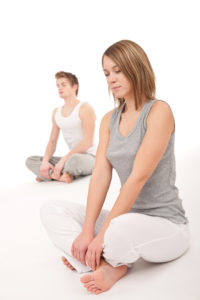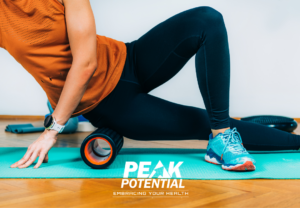You may consider yourself an expert at breathing.
It is after all something you have done for your
whole life.
However, this involuntary action is actually quite
complex and chances are you are not breathing
optimally.
We know our muscles can’t do anything without
oxygen. It is oxygen that causes them to contract
and to produce power. So, better breathing
equals better performing muscles. Therefore,
learning to breathe more efficiently can significantly
improve your health and fitness.
Breathing powerfully affects every system in
your body . . . cardiovascular, nervous, endocrine,
lymph, immune, digestive, and of course,
respiratory systems. It allows your body to
optimize oxygen transport to all these organs.
It’s not just about the oxygen though. Continuous
breathing increases nitric oxide in the blood. This
is an important gas that relaxes the arteries and
keeps the blood flow that you need to sustain your
activity. Not just to your muscles, but also your
brain.
The powerful results of an effective breathing
technique include:
- Reduction of stress and anxiety
- Improved mental clarity
- Lowered blood pressure
- Improved athletic performance
- Faster recovery time
Sounds good right?
But how do you know if your breathing is
inefficient?
There are three types of breathing issues
we often see:
- Mouth Breathing
- Over breathing or hyperventilating
- Upper Chest Breathing
- Mouth breathing
Mouth and nose breathing differ dramatically in
terms of the depth of your breath, in how the air
is “prepared”, and the physical effects they
produce. Mouth breathing can elevate your heart
rate and blood pressure. This can result in early
fatigue and dizziness when exercising.
At some point during strenuous exercise or running
it does become too difficult to nose breath, so work
on it during less strenuous activity and resort to
mouth breathing when you must.
People with respiratory issues, such as asthma or
Chronic Obstructive Pulmonary Disease (COPD), will
especially benefit from the warm, moist, clean air
that comes in through the nose.
- Over breathing
When you chronically over breathe, the heavier
breathing volume that’s coming into your lungs
can cause a disturbance of blood gasses, including
the loss of carbon dioxide. Eliminating too much
carbon dioxide from your bloodstream causes
your blood vessels to constrict— hence the light-
headedness you feel when hyperventilating.
So, even though it seems contradictory, the
heavier you breathe, the less oxygen that’s
actually delivered throughout your body
- Upper chest breathing
When most people take a deep breath you will
see their chest rise and fall. When you chest
breathe, your shoulders get tense and move up
and down. This shallow breathing can even
activate your body’s stress response. That’s
wasted energy — energy you should conserve
for the activity your performing.
Deep breathing from your diaphragm slows
down and regulates your breathing. If you are
breathing from your diaphragm you should see
your stomach expand when you inhale. This
allows you to get more oxygen into your lungs –
and to your muscles – during each breath. This
improves your oxygenation, and has a calming
effect because it activates your parasympathetic
nervous system (your bodies relaxation
response).
So, are you sold on this breathing thing?
Becoming aware of your breath is the first step
toward changing how you breathe. A couple of
times a day simply focus on your breath and
notice how you’re breathing. Place one hand on
your chest and the other on your belly, and focus
on taking slow, regular breaths through your
nose. On the inhalation, your belly should rise
before your chest.
You actually need to think about and control your
breath during your workout for peak performance.
Focused breathing during exercise will help you
optimize performance, endurance, post-exercise
energy levels, and even your ability to metabolize
fat. Next week, we will dig deeper into specifically
how to breath during different types of exercise.
Until then. . . .
Engage with us on Facebook @peakpotentialpt to
ask any questions and get more information on
breath work.




